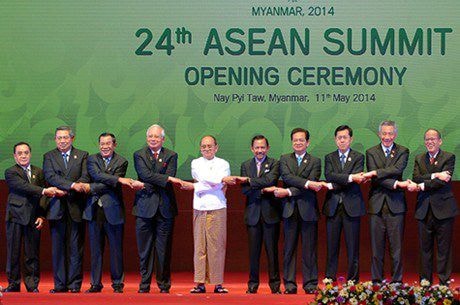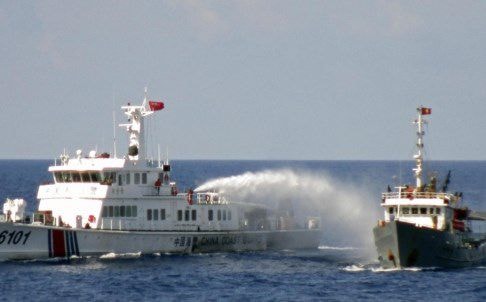10 trends that will dominate ASEAN in 2015
From Myanmar’s elections to ASEAN community building, 2015 will be an eventful year for Southeast Asian nations. Here are 10 strategic trends on the Southeast Asian geopolitical chessboard.
| RELATED NEWS |
|---|
1. Towards the ASEAN Community
The Diplomat magazine commented that 2015 will be an important year for regional integration. The end of 2015 is the deadline for the formation of an ASEAN Community, although talks have shifted to framing a "post-2015 agenda" for community building.
 |
| ASEAN leaders at the 24th Summit, held in Nay Pyi Taw, Myanmar, May 11, 2014 |
2015 is also an important year for economic integration, with the goal of achieving two free trade agreements, including the Regional Comprehensive Economic Partnership and the US-led Trans-Pacific Partnership involving four ASEAN countries. Along with the development of economic initiatives such as the China-funded Asian Infrastructure Investment Bank, this year will therefore be pivotal for the future of regional integration and the roles of both Washington and Beijing.
2. Malaysia takes on both roles in ASEAN and the United Nations
Malaysia will be in the spotlight in 2015 as it assumes both the ASEAN chairmanship and a non-permanent seat on the United Nations Security Council. While this will be an opportunity for the country to further assert its role as an original founding member of ASEAN and to exert its influence on the international stage, it will also be subject to increased scrutiny over its domestic politics, including its human rights record.
How Malaysia balances the challenges and opportunities of taking on both key roles will be interesting to see.
3. Elections in Myanmar
Myanmar's general election in late 2015 was the country's first since a semi-civilian government took power in 2011, after half a century of military rule.
This will be a key test of reform. It is possible that the National League for Democracy will win against the ruling Union Solidarity and Development Party and take a leading role in governing the country for the first time since being stripped of its electoral rights after winning the 1990 election.
4. Will the East Sea continue to be stormy?
The Diplomat magazine believes that, with what has happened in the past few years, it is impossible not to mention the East Sea in this list, although it is very difficult to predict exactly what will happen next.
 |
| Chinese ships spray water cannons at Vietnamese ships in the East Sea |
The important questions here are how ASEAN countries will adjust their responses to deal with China's strategy to gradually monopolize maritime territory in this region.
The decision of the Arbitral Tribunal at the International Criminal Court in The Hague on the Philippines' case against China could also influence events, and help parties expand their use of legal tools to seek clarity on ongoing maritime sovereignty disputes.
5. Bold reforms in Indonesia
After winning the 2014 election, observers are watching every move of Indonesian President Joko "Jokowi" Widodo, and wondering whether he can carry out some of his bold reforms in 2015.
On domestic policy, he has prioritized areas including health care, education and infrastructure. While these are necessary reforms, he may face significant obstacles from the opposition in parliament, financial difficulties and other obstacles.
In foreign policy, he has pursued a more flexible bilateral foreign policy, but may still face challenges both at home and abroad.
6. Thailand will gradually restore democracy
This will be a pivotal year for Thailand, as the ruling military government has charted a path that it says will restore democracy in the country following a military coup in May 2014.
According to a source from the Diplomat, a senior government official has announced that the election will be postponed until at least February 2016, while in 2015 the government will focus on drafting a new constitution and holding a referendum.
However, many people expect this time to be pushed earlier, because if this does not happen, the Golden Temple country may have to witness deadly confrontations between the military and protesters again.
7. The threat from the Islamic State IS
Experts predict that IS will likely continue to pose a serious threat to Southeast Asian countries in 2015. Indonesia and Malaysia, two predominantly Muslim countries, together with other ASEAN countries and international partners, need to be vigilant in countering this threat.
 |
| In 2014, the world was shocked by the rise of the self-proclaimed Islamic State (IS). |
Officials say the threat is growing stronger, more brutal and more daring, making an IS attack on a Southeast Asian country a real possibility in 2015.
8. Singapore will have a snap election
Many expect several snap elections to take place in Singapore in 2015, including the opposition Singapore Democratic Party, which will launch its election campaign in January 2015.
2011 was considered a political “turning point” for the island nation, when the People's Action Party (PAP), one of Singapore's two main political parties, received its lowest vote share since the island nation gained independence.
Since the PAP has been in power for more than four decades, new elections will determine whether the PAP continues to be “discredited” or recovers. Even if elections are not held, this year is still an important one for Singapore as the Lion City celebrates its 50th anniversary.
9. Philippines maintains peace with rebel groups
2015 is a pivotal year for peace efforts between the Philippines and the country’s rebel groups. The Philippine legislature needs to pass the Bangsamoro Basic Law, the negotiated agreement between the government and Muslim rebels in the south, to ensure that further progress is made in time for the creation of a new autonomous government in 2016 to help maintain peace.
Meanwhile, the government could also restart formal talks with rebels early this year to end Asia’s longest-running insurgency. Both plans pose challenges, but they are crucial for both the Philippines and ASEAN going forward.
10. Oil prices will affect the economies of Southeast Asian countries
According to some experts' predictions, if oil prices remain low in 2015, or even fall further, this could affect some major Southeast Asian countries.
Of particular note is Malaysia, an oil exporter that has seen severe impacts on its economy, and experts predict this will continue to some extent in 2015.
Vietnam is also affected, as it plays the role of both an oil exporter and a consumer, and we are also affected by public finance issues. Of course, low oil prices can also benefit many countries, especially the oil consuming countries in the ASEAN region, and even oil producing countries in some cases.
According to Infonet






